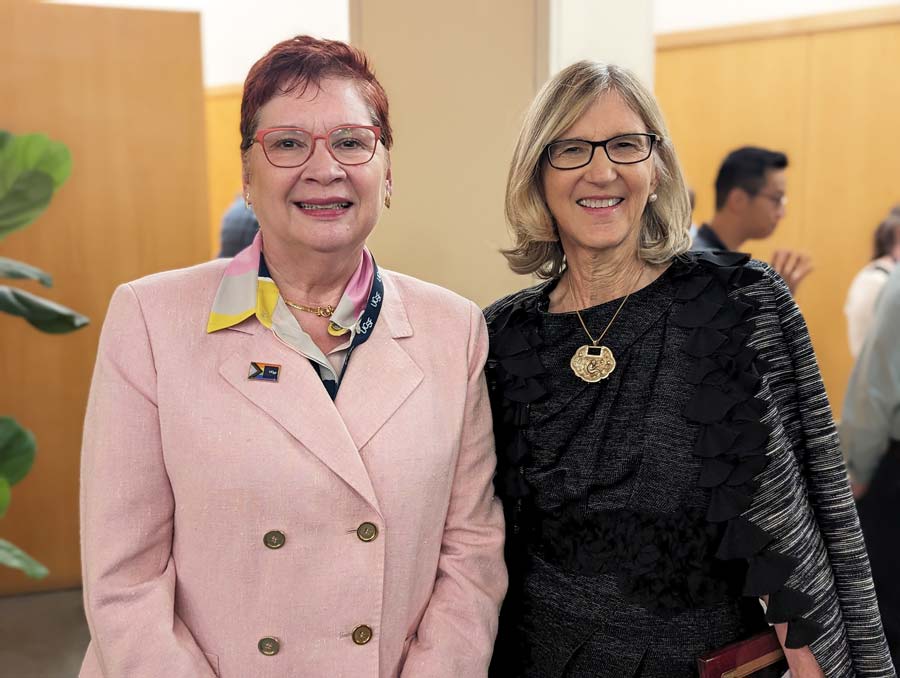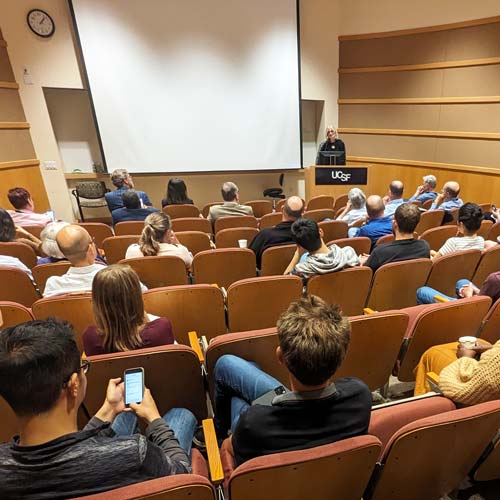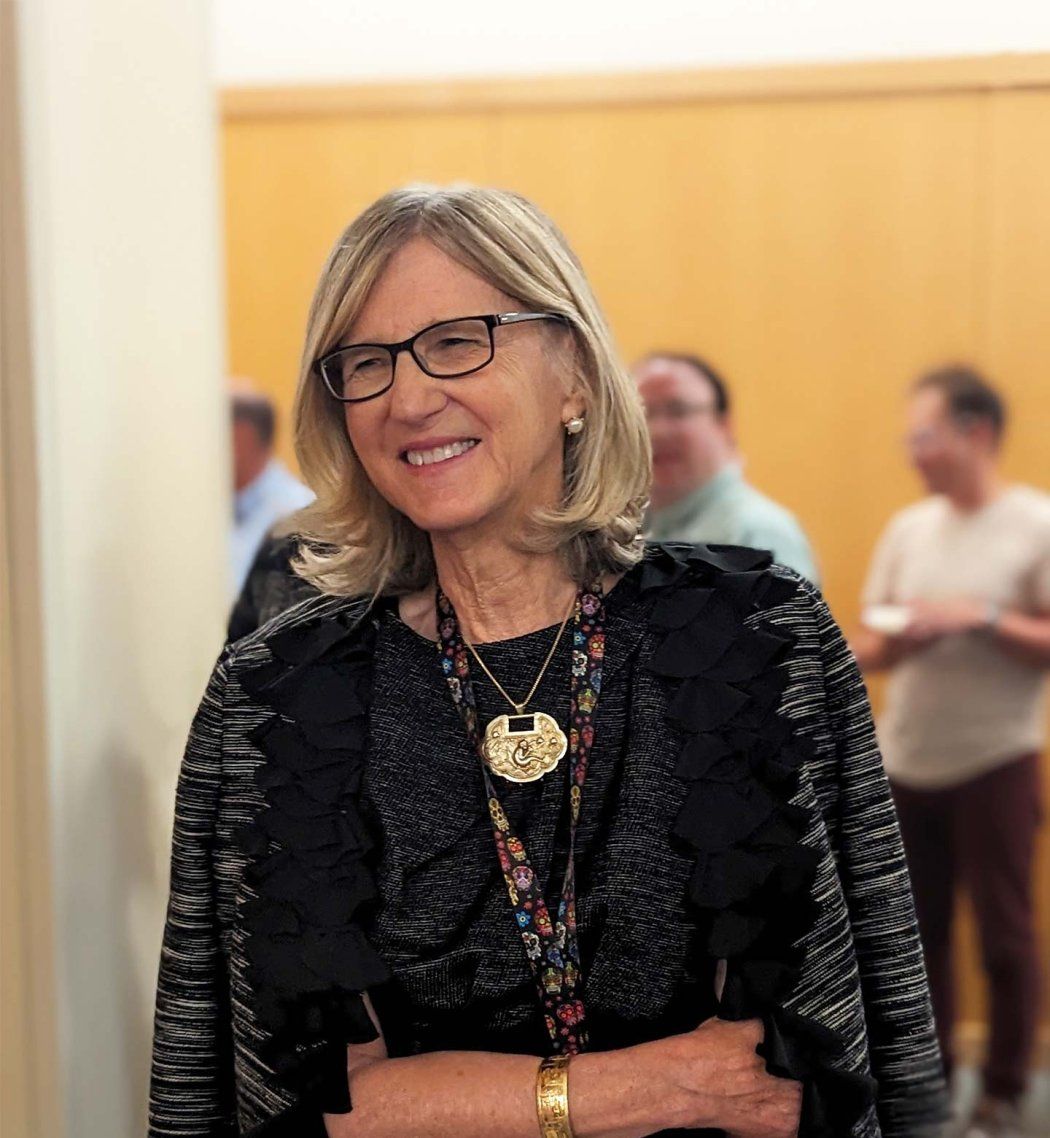Holly Ingraham, PhD, has “a lot to learn” when it comes to mentoring.
At least, that’s what she believes. Her peers don’t exactly see it that way.
The UCSF professor of cellular and molecular pharmacology said as much just minutes after receiving the 2023 Lifetime Achievement in Mentoring Award at the Mission Bay campus last month, surrounded by a crowd of UCSF learners, colleagues and leadership.
“I think probably that the most important thing for a mentor is understanding that the shoes you walk in are different from who you’re mentoring,” she said. “Be aware that their viewpoints are different (than yours) and you need to understand who they are in order to help them.”
The UCSF Faculty Mentoring Program established the prestigious annual Lifetime Achievement in Mentoring Award in 2007 as the first major award on campus that recognized the sustained commitment of senior faculty to mentoring. Recipients are selected through a nomination process and are assessed in four areas by a selection committee composed of senior faculty representatives from all four schools. Nominees are considered based on their impact to mentees’ career development, the career productivity of mentees, nomination letters, and the breadth and depth of mentoring across schools, departments and campuses.
Ingraham has made a career of understanding, helping and shaping those around her – a group that includes her husband, UCSF Nobel laureate David Julius, PhD.
“Your success relies on senior faculty and anybody above you being willing to offer support and sponsorship when you need it,” Ingraham said. “I think we’re much more enlightened now than we were 30 years ago because we understand that’s an important principle for any institution to thrive. You’re not just surviving at an institution, but you’re thriving at an institution. My efforts and many of my colleagues’ efforts to mentor people can really make a huge difference to people in reaching their potential.”
Born in Ukiah, Calif., Ingraham’s passion for science was ignited at 10 when she received her great-great-grandfather’s 1890 Bausch & Lomb microscope. From there, Ingraham used it to explore Northern California, “never to stop.” That inspired and fearless exploration led her to the East Bay, where a 10th grade biology teacher introduced her to DNA, a landmark moment in Ingraham’s life. She attended UC San Diego’s (UCSD) Revelle College for undergraduate degrees in biology and psychology, receiving her PhD in physiology and pharmacology from UCSD, and later serving as a postdoctoral fellow at the Salk Institute and UCSD.
Ingraham’s initial work at UCSF began by dissecting gonadal differentiation and continues today in studying sex differences between the gut and brain through the Ingraham Lab @ Mission Bay.
Diversity in science
But perhaps Ingraham’s most important work is propelling equity in science that’s made a lasting difference for those around her. Ingraham co-founded UCSF’s Women in Science group in 2016, assembled to connect women engaged in basic science research across the University so that they can affect change for other women faculty.
“When I started that, I just went off the data and I looked at how many women were in the basic science departments, how many women were chairs and directors of organized research units and realized that we had a problem,” Ingraham explained. “I looked at that data and I went to leadership and I said we had to do something about this because if you look around and you’re unhappy with the way things are, you can either decide to skip town and go to another place or you can try to make some changes. That’s what I decided to do, to get the collective mindset of our leadership to be proactive about hiring more women, about making sure that we’re thinking about women as leaders. They really listened.”
That difference was noted by those who spoke about Ingraham’s numerous achievements, including Executive Vice Chancellor and Provost Catherine Lucey. “She turned her lived experience as a woman scientist…to make the road for women scientists easier,” Lucey noted.

“She turned her lived experience as a woman scientist…to make the road for women scientists easier.”
Catherine Lucey, Executive Vice Chancellor and Provost
Among those professional achievements – too many to list here – Ingraham was the recipient of the UCSF Chancellor Award for Dr. Martin Luther King, Jr. Leadership in 2017 due in large part to her work with the IRACDA Program, which offers a four-year career development opportunity including salary support to facilitate postdoctoral scholars’ successful transition to pursue independent research and teaching careers in academia. The program – which last year received a $5 million grant for renewal from the National Institutes of Health – offers mentored experience in research, teaching and research mentoring in conjunction with San Francisco State University.
Her work doesn’t stop there. Ingraham typically sets aside her summer to help IRACDA scholars write grants and has helped postdoctoral fellows achieve faculty positions at a diverse range of institutions including: Columbia University, Vanderbilt University, Massachusetts Institute of Technology, UC Berkeley, San Jose State University, San Diego State University and SFSU.
Ingraham also became an elected member of the American Academy of Arts and Sciences in 2019 and National Academy of Sciences in 2021.
Putting people first
When it came to this award, Ingraham’s colleagues didn’t think twice in submitting her name. “There are some nominations that write themselves…this is a very easy task to talk about all the things that Holly has done,” said Dyche Mullins, PhD.
Mullins, who along with Danica Galonic Fujimori, PhD nominated Ingraham for this year’s mentorship award, highlighted the reputation Ingraham has built for herself at UCSF. “You hear a lot of stories about what Holly has done for other people,” Mullins said. “She has gone way out of her way. She really puts in the hard work of mentoring people and helping them succeed.”
For Ingraham, a room full of people she’s supported over the years is just the beginning – because she believes her impact lies in how they succeed in their own careers.
“I think it’s really wonderful because that’s what you hope for as you grow older,” Ingraham said. “You want to create a legacy of what your efforts mean to the community and to UCSF. I think seeing the trainees that have gone out there and started their own labs. They’ve taken some of my words of wisdom and they’re affecting people now and making a difference.”
To that end, her work continues in making science accessible.
“I really do feel strongly that academic biomedical research should be available to people that really want to pursue this career. To me, that’s the most important thing that they should be able to gain the soft skills that they need and gain the support that they might need to do that.”

The UCSF Faculty Mentoring Program established the prestigious annual Lifetime Achievement in Mentoring Award in 2007 as the first major award on campus that recognized the sustained commitment of senior faculty to mentoring.
